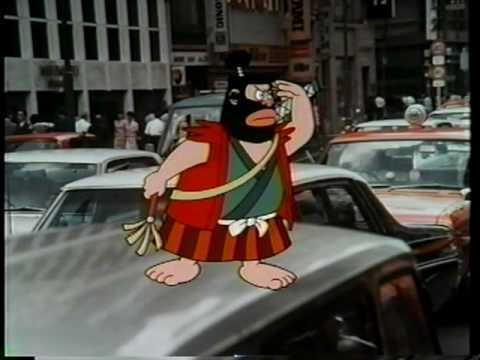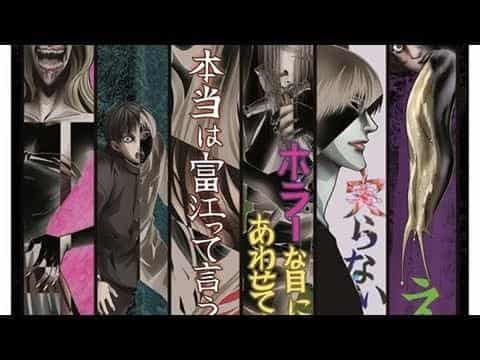Review of "Tokyo Bandits": A unique anime that depicts the dark side of the city

Tokyo Bandits■ Public MediaTV Special ■ Original MediaAnime Original ■ Broadcast periodApril 18, 1970 - January 1, 0000 ■Broadcasting stationNHK Educational ■Frequencieshalf an hour ■ Number of EpisodesEpisode 1 ■Original Story・Written by Rokusuke Naga ■ ProductionAnimation: Mushi Productions, Yasuhiko Yoneyama, Shigeyuki Sugi, Renshi Kinoshita Production: Toshio Endo ■ StorySuddenly, on the roads of Tokyo's Ginza district, where traffic is swarming with cars, some animated bandits appear and overturn cars on the road. The cars that overturned were all cars that had previously had traffic violations or accidents. The bandits were characters created by Wada, a salesman for Mizumushi Pharmaceuticals, and were written on the car doors. Wada was involved in a rear-end collision in Ginza, hurting his neck. Wada lost consciousness for a moment, but when he came to, all the cars around him were overturned. No one knew who the culprit was, but Wada felt like he had definitely seen the bandit characters written on the doors. Despite a desperate investigation by the Metropolitan Police Department, the cause was unknown. The investigation was led by Officer Kashiwagi, a Mizumushi, and his girlfriend Hiroko. This 30-minute variety show features songs, dances, and Mushi Productions animation. ■ExplanationA musical comedy that uses animation to satirize the ever-increasing number of traffic accidents. It is a remake of "Ginza no Sanzoku" (Ginza Bandits), which aired on NHK Educational TV in 1962. Mushi Production Corporation also used their Vampire compositing technology to create commercials. Compositing live action and animation was Mushi Production Corporation's specialty at Ekoda Studio. This work was a special recommendation at the Montreux Golden Rose International Television Festival. ■Cast・Kashiwagi/Hiroshi Sekiguchi・Hiroko/Kaoru Yumi・Chief of the Metropolitan Police Department/Ichiro Mikuni・Officer Furuya/Osami Nabe・Announcer at roundtable/Mie Nakao・Man at roundtable/Senri Sakurai・Dump truck driver/Jerry Fujio・Nurse/Mari Sono・Announcer/Rosa Anegawa, R. Holthaus, F. Gruber・Minister/Tetsuya Kaji・Muchiu Cheese/Duke Aces・Voice of the bandit boss/Kazuo Kumakura・Voice of the bandit henchman/Theatre Echo・Commentator/Fumi Tatsuoka・Priest/Hideo Fukuhara・Commander/Shu Wada・Patrol car/Katsuharu Sasaoka・Driver/Taijiro Ono・Housewife/Akiko Ishibashi・Young person/Genji Tamura, Yasuo Tsuchiya・Madam/Nobuko Hashimoto・Photographer/Sachi Yoshimura・Nurse/Hideko Takigami・Crowd/Hoshi Pro・Shrine maiden/Shoichi Ozawa・Wada/Kanichi Tani※Includes live-action characters ■ Main staff・Story by Rokusuke Naga・Music by Hachidai Nakamura・Performance by the New Chamber Music Association・Lyrics by Shoichi Inoue and Koji Kaze・Choreography by Kiyohiko Kawanishi・Cinematography by Takao Takashi・Lighting by Tadahiko Kojima・Sound by Nobutaka Uematsu・Editing by Shinji Aono・Art by Akira Hoshino・Effects by Kiyoshi Kawasaki・Special effects by Kunihiko Tanaka・Animation by Mushi Productions, Yasuhiko Yoneyama, Shigeyuki Sugi, Renshi Kinoshita・Production by Toshio Endo・Direction by Norihiko Suemori Tokyo Bandits - Tokyo Bandits Review"Tokyo no Sanzoku," broadcast on NHK Educational TV in 1970, is a musical comedy that satirizes the increasing number of traffic accidents, and made a strong impression on viewers at the time. This work is a remake of "Ginza no Sanzoku," also broadcast on NHK Educational TV in 1962, and is characterized by the combination of live action and animation, making full use of the technical capabilities of Mushi Productions. Below, we will take a closer look at the appeal and background of this work, as well as its modern-day reputation. Background and intent of the work"Tokyo Bandits" was produced to satirize the social problem of increasing traffic accidents. In the 1970s, Japan was experiencing rapid economic growth, which led to the widespread use of automobiles, and the number of traffic accidents was steadily increasing. With this situation as a backdrop, Naga Rokusuke wrote the script and Mushi Productions was in charge of the animation, aiming to raise awareness of the issue among viewers. Naga Rokusuke is known for his scripts that skillfully incorporate social satire, and he demonstrates his talent in "Tokyo no Sanzoku." In particular, the story features Wada, a salesman for athlete's foot medicine, as the protagonist, and the bandit character he portrays is at the center of the story, providing laughs to the audience while also being an effective means of raising awareness of the dangers of traffic accidents. A fusion of animation and live actionThe biggest feature of "Tokyo Bandits" is Mushi Production's specialty, live-action and animation compositing technology. Mushi Production produces commercials and TV programs using Vampire's compositing technology, and this technology is also used in "Tokyo Bandits." In particular, in the scene where a car flips over on the streets of Ginza, the animated bandits blend naturally into the live-action footage, creating a visual impact. This compositing technique provided a fresh surprise to the viewers at the time, and was one of the factors that increased the appeal of the work. In addition, the fact that the work was selected as a special recommendation at the Montreux Golden Rose International Television Festival is also proof that Mushi Production's technical capabilities were highly evaluated. Music and Performance"Tokyo Bandits" is a musical comedy, with music and performance playing an important role. The music, written by Hachidai Nakamura, is characterized by its light and catchy melody, and has captured the hearts of viewers. The lyrics, written by Shoichi Inoue and Koji Kaze, also skillfully express the theme of the work. The dance scenes, choreographed by Kiyohiko Kawanishi, are also not to be missed. In particular, the performance of Kaoru Yumi, who plays Hiroko, left a strong impression on viewers. The scenes that combine singing and dancing not only increase the entertainment value of the work, but also function as a means of satirizing the problem of traffic accidents. Cast and charactersThe cast of "Tokyo Bandits" includes many popular actors and voice actors from the time. The acting skills of the actors who play each character, such as Hiroshi Sekiguchi as Kashiwagi, Kaoru Yumi as Hiroko, and Ichiro Mikuni as the Metropolitan Police Chief, enhance the quality of the work. Kazuo Kumakura, who voiced the bandit boss, and the voice actors of Theatre Echo, who voiced the bandit henchmen, also give the work a unique atmosphere. In particular, the performance of Kanichi Tani, who played Wada, a salesman for Athlete's Foot Pharmaceuticals, resonated with viewers. With Wada's bandit character at the center of the story, viewers were able to think about the problem of traffic accidents from Wada's perspective. In addition, the scene in which Wada is involved in a rear-end collision and hurts his neck realistically depicts the dangers of traffic accidents, sending a strong message to viewers. Modern RecognitionAlthough "Tokyo Bandits" was made in the 1970s, it has not lost its value even today. In particular, traffic accidents are still a social issue, and the theme of the work resonates with modern viewers. Furthermore, Mushi Production's live-action and animation compositing techniques were very advanced considering the technical standards of the time, and they continue to influence modern animation production. Furthermore, "Tokyo Bandits" has been praised for its method of satirizing social issues through the format of a musical comedy. The work, which brings together the talents of each staff member, including the screenplay by Rokusuke Nagai, the music by Hachidai Nakamura, and the choreography by Kiyohiko Kawanishi, has succeeded in conveying a deep message while providing laughs and emotions to the audience. Recommendations and how to watch"Tokyo Bandits" is a musical comedy that satirizes the problem of traffic accidents and can be recommended to a wide range of viewers. It is a must-see for those who want to know about Japanese society in the 1970s and those who want to experience the technical capabilities of Mushi Productions. It is also enjoyable for those who like musicals and comedies. It is possible to watch it on NHK archives or on DVDs and other media. In particular, NHK's online service allows you to watch past masterpieces, so you will likely be able to find "Tokyo no Sanzoku" as well. Also, by watching it together with other works by Mushi Productions, you can get a sense of the evolution of animation technology at the time. Conclusion"Tokyo Bandits" is a musical comedy that satirizes the problem of traffic accidents, and it sent a strong message to Japanese society in the 1970s. The work, which brought together the talents of each staff member, including Mushi Production's live-action and animation compositing technology, Naga Rokusuke's script, Nakamura Hachidai's music, and Kawanishi Kiyohiko's choreography, succeeds in conveying a deep message while providing viewers with laughter and emotion. "Tokyo Bandits" has not lost its value even today, and can be said to be a masterpiece that can be recommended to a wide range of viewers. |
<<: Smokey Bear's Song: A thorough review of the moving collaborative project
>>: Review of "Eleven Red Blood": A touching soccer anime full of blood and tears
Recommend
The final trailer of "G.I. Joe: Snake Eyes Origins" will be released in North America on July 23
Paramount released the final trailer of "G.I...
Guo Jingming's "Jade Dynasty 2: The Cold-Blooded Banquet" is scheduled to be released on Tencent Video on December 4
Directed by Guo Jingming, the second film in the ...
Shocking benefit! All 168 works of the manga godfather Tezuka Osamu are available for free to read in commemoration of the 90th anniversary
Japan's largest e-manga bookstore "eBook...
In August, the total domestic box office exceeded 6 billion yuan. Domestic films beat Hollywood films.
There is new news today. According to Maoyan Prof...
Netflix's live-action Legend of Zelda TV series has been canceled, sources say
It is reported that the live-action "Legend ...
Spider-Man: No Homecoming releases world's first poster & new trailer
Today (November 8), Spider-Man 3: No Homecoming r...
The new Pokémon animation trailer is released and will be officially launched on November 17
Today (September 29), The Pokémon Company officia...
Avatar: The Last Airbender announces plans for three character-themed movies
Paramount and Nickelodeon recently announced that...
The release of "The Captain" and "The Climbers" will be postponed to the end of November
Today (October 23), China Film Distribution Compa...
Kantaro the North Wind Boy: The appeal and evaluation of the 1974 version of "Minna no Uta"
Kantaro the North Wind Boy overview "Kantaro...
The Legend of Zelda live-action movie director promises to please fans of the series
Wes Boll, the director of Sony Pictures' upco...
Detailed review and rating of ROD-THE TV-Episode 2
The appeal and reviews of ROD -THE TV-: The adven...
"X-Men: New Mutants" horror poster shows five mutants with shining eyes
Recently, the new poster and stills of the movie ...
Marvel Animated Series "What If" Releases New Trailer British Female Captain is Coming
The Marvel animated series "What If" re...
Naoki Urasawa and Osamu Tezuka's masterpiece "PLUTO" is Netflix's first animation
Netflix announced that the first animation of Nao...









